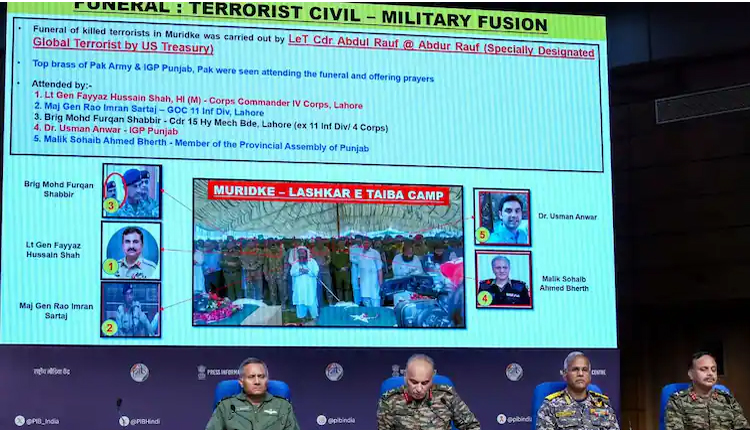New Delhi: India revealed the identities of Pakistani military officers who were present at the funerals of terrorists eliminated in ‘Operation Sindoor’. This highlighted uncomfortable connections between the Pakistani military and terrorist groups. A series of surgical strikes conducted on May 7 the operation destroyed nine terrorist dens. These included Lashkar-e-Taiba’s Markaz Tayyaba in Muridke, Jaish-e-Mohammed’s Markaz Subhan Allah in Bahawalpur and Hizbul Mujahideen’s Mahmuda Zoya in Sialkot.
Pictures published by Indian authorities show a Lashkar-e-Taiba commander named Abdul Rauf — identified by the U.S. as a global terrorist — praying in front of the Muridke funeral. He was accompanied by senior Pakistani military leaders, including Lieutenant General Fayyaz Hussain Shah, Major General Rao Imran Sartaj and Brigadier Mohammad Furqan Shahbir. Photos that emerged from the event included a high-ranking police official, Usman Anwar, and a politician, Malik Sohaib Ahmad. This suggests attendance at a state-sponsored ceremony for terrorists whose coffins adorned in Pakistani flags had been paraded around.
India’s incriminating evidence highlights the close linkages between Pakistan’s deep state and terror outfits. More than 100 militants, including high-value targets, were killed in ‘Operation Sindoor’, and their identity has also been revealed. Khalid (alias Abu Akasha), a Lashkar-e-Taiba operative active in Jammu and Kashmir, including a key role in weapons smuggling from Afghanistan to Pakistan, was one of those. Abu Jundal, Mudassar Khadian Khas, who functioned at a Muridke terrorist camp Another victim was Mohammad Hasan Khan, the son of Jaish-e-Mohammed’s operations chief in Pakistan-occupied Kashmir, Mufti Asgar Khan Kashmiri. He was associated with the group’s Syedna Bilal camp, where 2019 Pulwama attack conspirator Ashiq Negaru operated.
Those linked to major past assaults, such as the 1999 IC-814 hijacking and the 2019 Pulwama bombing, were also among the targets. They also killed Yusuf Azhar, Abdul Malik Rauf and Mudassir Ahmad. These figures are associated with the mainstay of terror in the region. Targeting them has dealt a blow to India’s terrorism infrastructure, said the statement.
Images from the funeral have sparked controversy, with India accusing Pakistan of sheltering terrorists and paying tribute to them. Amid a fragile ceasefire that ushers in a momentary lull in tensions, these reveals apply unprecedented scrutiny to Pakistan’s dual identity as state and sanctuary of extremism. They raise concerning questions about retribution in the struggle against terrorism.



Comments are closed.